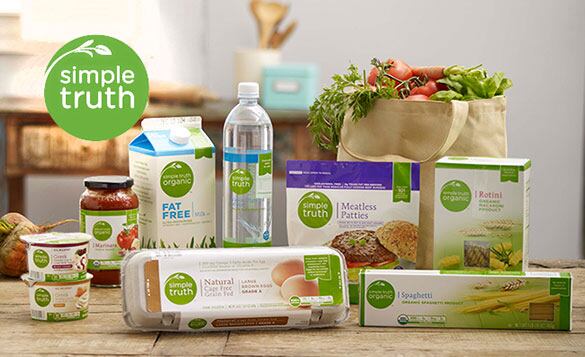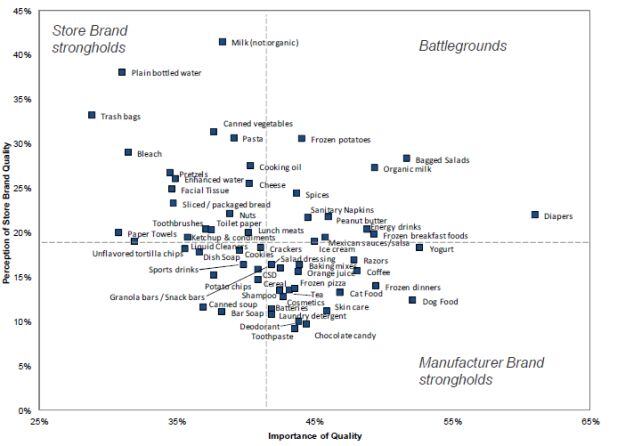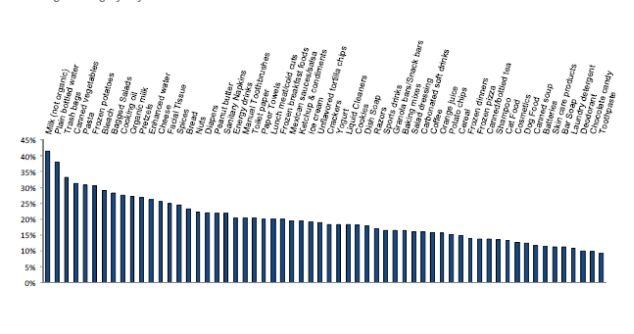A survey of 3,191 Americans conducted by market research and consulting firm Consumer Edge Insight in June 2013, suggests there are strong growth opportunities for store brands, which it predicts will continue to gain share even as the economy recovers.
While higher gas and food prices may contribute to higher levels of store brand usage, all the evidence suggests that, “rising store brand usage is a secular trend that will continue”, predicts the report.
“Compared to last year [when Consumer Edge Insight conducted the same survey], buying store brands is becoming less of a price-driven decision as quality keeps improving.”
Buying store brands is becoming less of a price-driven decision as quality keeps improving
The survey findings reflect the fact that US retailers are become far more sophisticated in their approach to private label, investing in multi-tiered programs (good, better, best) and improved packaging, Consumer Edge Insight president of David Decker told FoodNavigator-USA.
They are also putting genuine marketing muscle into store brands, he added.
“Store brands are no longer just generic copies of national brands. There has been a real sea change in the past couple of years. Product quality is getting better and private label manufacturers are hiring top people from the big packaged food companies.”
Trash bags, plain water, and pasta are most likely to see further store brand gains
So which categories are ripe for expansion?
“Categories where low price is important and where store brand quality is good and/or rising are most likely to see further store brand growth,” predicted Decker.
“Trash bags, plain water, and pasta are most likely to see further store brand gains, with deodorant, candy, and toothpaste being the least likely.”
Indeed, in many categories, store brands are now establishing themselves as preferred and/or habitual alternatives to national brands, he added.
However, big brands can claw back the initiative if they improve quality, taste or performance, especially in categories such as energy drinks, skin care products, batteries and frozen pizza, he suggested.
Categories where quality is important and store brand quality is high are the biggest battlegrounds
As to why consumer perceptions of the quality of store brands vary so markedly across different categories, a complex set of factors is at play, said Decker, including consumer affinity for certain brands (I always buy this brand/this is my favorite brand).
For example, asked if they agreed with the statement, ‘store brands offer just as good quality as manufacturer brands’, for any given category, 41% of shoppers said yes for milk (non-organic), while just 10% agreed this was the case for chocolate candy.
Store brand quality deemed high for canned veg, pasta, bagged salads and cooking oil, and low for chocolate candy, canned soup and dogfood
The 10 top categories where store brands were perceived as offering comparable quality to national brands were: Non-organic milk (41%), plain bottled water (37%), trash bags (33%), canned veg (32%), pasta (31%), frozen potatoes (31%), bleach (29%), bagged salads (28%), cooking oil, and organic milk (both 27%).
The bottom 10 were: Toothpaste, chocolate candy, deodorant, laundry detergent, bar soap, skincare products, batteries, canned soup, dog food and cosmetics, with just 10-13% agreeing that store brands “offer just as good quality as manufacturer brands”.
So what can we learn from this, and should firms trying to make private label chocolate canned soup and dogfood just give up?
Of course not, said Decker, but they may face more hurdles than firms making store bagged salads or frozen potatoes.
Categories where "quality is important and store brand quality is high will provide most intense rivalries with manufacturer brands”, added Decker.
Who are the heaviest store brand users?

As for who is buying store brands, pretty much everyone, he says. However, heavy store brand users are more likely to be women, under 35, low income and Hispanic or African American, he said.
However, high income consumers were just as likely as low income consumers to agree with the statement: “It’s foolish to pay more for manufacturer brands if the same quality is available from a store brand.”
How can national brands claw back the initiative?
According to a recent report by Rabobank’s Food & Agribusiness Research and Advisory group, private label penetration (currently around 18%) could reach 25-30% in the US retail market in ten years.
The report, ‘What Would Apple Do? How Can U.S. Branded Food Companies Withstand the Retailer Brand Onslaught?’ was written by analyst Nicholas Fereday, who said national brands must up their game if they want to regain the initiative.
“Many national brand owners need to be bolder in their thinking and strategizing. Instead of opting for low cost, low risk, conservative solutions, they need to think and act more like the Apples of the world, innovating new game-changing food products and entering new categories.

Where do the retailers stand on private label?
According to a white paper from Trace One and Planet Retail, private label represented an estimated 25% of 2011 food sales at Safeway, 18% of food sales at Costco and Walmart, 27% at Kroger and 20.5% at Walgreens.

